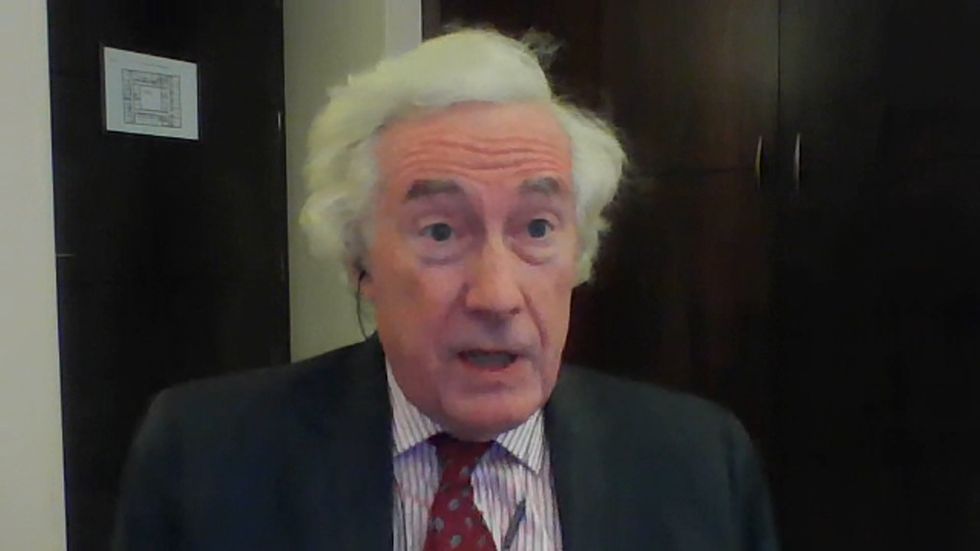Covid lockdown was ‘COMPLETE FAILURE of government’ and ‘radical experiment’ says Lord Sumption

GB News

The Government had no right to impose a lockdown during the Covid pandemic and embarked on “radical experiment with human life” without Parliamentary scrutiny, according to former Supreme Court judge Lord Sumption.
In a blistering attack he told GB News on Friday: “The National Audit Office, last July, gave us fairly up to date estimates of the costs of the lockdown. They put the cost to the Government at £376 billion. That's an enormous sum.
Lord Sumption said there was never "a cost benefit analysis, in spite of voices like Sunak’s own."
Leon Neal
“It's by far the biggest contributor to our current financial crisis. That's fair to say that some part of that £376 billion pounds would have been incurred even if we hadn't locked people down.
“About a quarter of it, a bit less than a quarter, has been spent, for example, on improving health services, but the greater part wouldn’t have been incurred, it would have been avoided if we hadn't locked people down.
“This is an example, it's the most dramatic example, of what Rishi Sunak said in an interview in the Spectator a few weeks ago when he pointed out the complete failure of the Government even to consider the collateral costs of lockdown before making the decision. There never was a cost benefit analysis, in spite of voices like Sunak’s own.
“You really can't embark on a radical experiment with human life like this without actually working out the consequences.”
During an interview with Phillip Davies and Esther McVey on GB News, he continued: “When you look at the balance of factors, I don't think there was ever the slightest prospect, even in an age of human rights, that the courts were going to take over the Government's function in measuring the consequences
“The really critical issue was whether the Government had the power to do these things at all without any effective parliamentary supervision.
“My view is that they did not. They should have used an Emergency Powers Act called the Civil Contingencies Act, which would have enabled Parliament to control the basis on which this was continuing, and how long it was continuing, and on what terms.
“They didn't do that. The courts, I think, shamefully failed to intervene to make them.”
He added: “In other countries courts did intervene. The Spanish courts famously said, you can't do something as serious as this without using emergency powers that give the parliament the right to supervise at every stage. Our courts did not do the same.
“The French courts intervened repeatedly. They had a fast track process to knock down any excessive measures taken by the government, which they used several times. The German courts stood up for the right of protests, ours did not.
“The deafening silence of the human rights lobby in the face of this really is quite remarkable.”
Lord Sumpton said: “The deafening silence of the human rights lobby in the face of this really is quite remarkable.”
GB News
Lord Sumption told GB News: “To my mind, the biggest governmental failure on this was the refusal of the Government to consider most of the relevant factors. And it was a refusal, it wasn't just carelessness, as Rishi Sunak has made clear, the official line was not even to recognise that the collateral costs were there, let alone that they were serious.”
Lord Sumption was also asked about a proposal in Scotland to stop jury trials for sex offences.
On this he told GB News: “Well, the experience of other countries like New Zealand, who have introduced an option by defendants to opt for trial by judges rather than by juries, suggests that the more serious the offences, the more likely the offender is to do better.
“And in a judge-only trial, so I suspect they may will find that the result of this change is in fact to reduce the conviction rate, because juries have a well established dislike of sexual offenders, especially when it involves young or vulnerable people, which sometimes blinds them to the weakness of the evidence, particularly in very old cases.
“I think that we have to have juries because they inspire public confidence. Public Confidence is absolutely fundamental in the criminal law.
“But I do think we've got to be aware of the price we pay for having juries, which is that you have people convicted by a tribunal that doesn't actually have to give its reasons and that can lead to really quite serious injustice.”